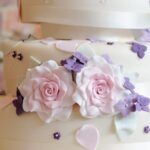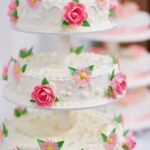Cake decorating has become increasingly popular in recent years, with people discovering the art and joy of transforming simple cakes into extraordinary masterpieces. This craft requires a unique combination of creativity and precision, allowing decorators to unleash their imagination while paying careful attention to detail. If you have ever been captivated by stunningly decorated cakes and dreamt of creating your own edible works of art, then becoming a cake decorator might be the perfect path for you.
In this article, we will guide you through the journey of how to become a cake decorator. We will explore the foundations of this craft, including the importance of personal interest and motivation in discovering your passion for cake decorating. From there, we will delve into the necessary skills and qualities that every successful cake decorator should possess, as well as different options for formal training and education.
No matter your current skill level or experience in baking, this article aims to provide you with a comprehensive roadmap to becoming a proficient cake decorator. We will cover building your collection of essential tools and equipment, gaining hands-on experience through internships and apprenticeships, and how to showcase your creations in a professional portfolio.
Finally, we will discuss how to turn your passion for cake decorating into a profitable career, offering insights on starting a home-based business as well as scaling up into a storefront. Additionally, we will emphasize the importance of continuing education and growth in this industry by attending workshops and events, networking with other professionals, and staying abreast of the latest trends.
The sweet journey of becoming a cake decorator is one filled with creativity, joy, and the ability to bring smiles to people’s faces through delicious edible creations. So whether you are just starting out or looking to take your skills to the next level professionall.
Discover Your Passion for Cake Decorating
Discovering your passion for cake decorating is an essential step on the journey to becoming a skilled and successful cake decorator. It is the foundation upon which you will build your skills, techniques, and unique style. By exploring different cake decoration styles and techniques, you can find what truly inspires you and motivates you to create stunning edible works of art.
Personal Interest and Motivation
To begin your cake decorating journey, it is important to start with personal interest and motivation. Ask yourself why you are drawn to this craft and what inspires you about it. Perhaps it’s the joy of creating something beautiful out of simple ingredients, or the satisfaction of seeing people’s delighted reactions when they see your creations. Understanding your personal motivation will help fuel your passion as you learn and grow as a cake decorator.
Exploring Different Cake Decoration Styles and Techniques
Cake decorating offers a wide range of styles and techniques to explore. From classic buttercream flowers to intricate fondant designs, the options are endless. Take the time to experiment with different styles by watching tutorials, attending workshops, or even taking short courses in various techniques. This exploration will help you discover what resonates with you most and allows you to develop your own unique style as a cake decorator.
As you delve into different cake decoration styles, don’t be afraid to try new things and push your creative boundaries. Remember that mistakes are opportunities for growth, so embrace them as learning experiences rather than setbacks. Engage in continuous experimentation until you find the styles that truly ignite your passion for cake decorating.
By discovering your passion for cake decorating through personal interest and exploration of different styles and techniques, you will lay a strong foundation for your future endeavors in this craft. Your enthusiasm will provide the drive needed to excel in this field while also bringing joy and fulfillment throughout every step of your cake decorating journey.
Necessary Skills and Qualities of a Cake Decorator
Cake decorating is not just an art form, but also a skill that requires certain qualities and abilities. To excel in this craft, a cake decorator must possess the following skills and qualities:
- Detail-oriented and patient: Attention to detail is crucial in cake decorating as even the smallest mistake can impact the overall appearance of the cake. A cake decorator needs to have a keen eye for precision and patience to ensure that every element of their design is executed flawlessly.
- Good hand-eye coordination and artistic flair: Cake decorating involves intricate designs and delicate techniques such as piping, fondant work, and sugar crafting. Having excellent hand-eye coordination allows decorators to manipulate tools with ease while maintaining control over their movements. Additionally, artistic flair helps in creating visually appealing designs that are both aesthetically pleasing and unique.
- Basic knowledge of baking and pastry techniques: While creativity plays a significant role in cake decorating, having a solid foundation in baking and pastry techniques is equally important. Understanding how different ingredients work together, knowing proper baking temperatures and times, and being familiar with various frosting recipes are essential skills for a successful cake decorator.
| Educational Option | Description |
|---|---|
| Cake Decorating Courses or Workshops | Enrolling in formal training programs designed specifically for cake decoration provides hands-on experience under the guidance of experienced professionals. |
| Learning from Experienced Professionals | Shadowing or apprenticing with experienced cake decorators offers invaluable insights into the industry’s best practices. |
| Self-study and Online Resources | Many online platforms offer tutorials, webinars, and e-courses that allow individuals to learn at their own pace and convenience. |
By acquiring the necessary skills and qualities through formal training or self-study, individuals can lay a strong foundation for a successful career in cake decorating. With these fundamental aspects in place, aspiring cake decorators can proceed to build their toolkit of essential tools and equipment.
Educate Yourself
Formal training and education play a crucial role in becoming a skilled cake decorator. While it is possible to learn through trial and error or self-study, enrolling in cake decorating courses or workshops can provide invaluable guidance and structured learning.
One option for formal training is to enroll in a culinary school that offers specialized programs in baking and pastry arts. These programs typically cover a wide range of topics including cake decoration techniques, fondant work, sugarcraft, and piping skills. By attending classes taught by experienced instructors, students have the opportunity to learn from professionals who can provide guidance, feedback, and mentorship.
Another option for those interested in cake decorating is to attend specialized cake decorating schools or workshops. These schools often offer short-term intensive programs that focus solely on cake decoration techniques and industry-specific knowledge. Students may have the opportunity to work with different types of cakes, practice various decorating methods, and create elaborate designs under the supervision of experienced instructors.
For individuals who prefer a more flexible learning schedule or are unable to attend physical classes or workshops, there are also online resources available for honing cake decorating skills. Many established decorators offer online tutorials and courses that cover different aspects of cake decoration. These resources often include video demonstrations, step-by-step instructions, and downloadable materials to help learners master specific techniques at their own pace.
| Educational Option | Description |
|---|---|
| Culinary School | Offers comprehensive programs covering various aspects of baking and pastry arts. |
| Specialized Cake Decorating Schools/Workshops | Provide focused training on specific cake decoration techniques under the guidance of experienced instructors. |
| Online Resources | Offer flexible learning options with video tutorials and downloadable materials for self-study. |
Investing in formal training and education can provide aspiring cake decorators with a strong foundation of knowledge and skills. Whether it is through traditional culinary schools, specialized cake decorating programs, or online resources, the opportunity to learn from experienced professionals can greatly enhance one’s ability to create beautiful and intricate designs on cakes. It is important for individuals to consider their learning style, budget, and time commitments when choosing the educational option that best suits their needs.
Building Your Cake Decorating Toolkit
When it comes to cake decorating, having the right tools and equipment is essential for creating beautiful and professional-looking designs. Building your cake decorating toolkit may seem overwhelming at first, but with some guidance, you can gather everything you need to get started.
Essential Tools for a Beginner Decorator
As a beginner cake decorator, there are a few essential tools that you should have in your toolkit. These include:
- Piping Bags and Tips: Piping bags are used for adding decorative elements like borders and designs to cakes, while piping tips determine the shape and texture of the decorations.
- Offset Spatula: An offset spatula is useful for spreading frosting or buttercream evenly on the cake’s surface.
- Turntable: A turntable allows you to easily rotate the cake as you decorate, ensuring even coverage.
- Bench Scraper or Palette Knife: These tools help achieve smooth sides and sharp edges on a cake.
- Cooling Rack: A cooling rack is essential for allowing your cakes to cool properly before decorating.
Budget-Friendly Options and Alternatives
If you’re on a tight budget, there are cost-effective alternatives for many of the tools mentioned above. For example, instead of investing in expensive piping tips right away, you can start with a basic set that includes common shapes like round and star tips. Additionally, instead of purchasing an expensive turntable, you can use an upside-down bowl or plate as a makeshift option.
Remember that while budget-friendly alternatives can be helpful when starting out, investing in high-quality tools as you progress will make a difference in the quality of your work.
Expanding Your Collection
As you gain more experience and confidence in cake decorating, it’s important to continue expanding your collection of tools and equipment. Some additional items that can enhance your creations include:
- Fondant Smoother: This tool is essential for achieving a polished and professional finish when working with fondant.
- Cake Leveler: A cake leveler helps you achieve level and even layers when slicing your cake.
- Airbrush Kit: An airbrush kit allows you to create intricate designs and add color gradients to your cakes.
Investing in quality tools as you progress will not only make your work more efficient but also improve the overall quality of your creations.
By building a well-rounded cake decorating toolkit, you’ll have everything you need to bring your creative vision to life. Remember to start with the essentials, explore budget-friendly options if needed, and gradually expand your collection as you continue to grow as a cake decorator. Happy decorating.
Gaining Hands-on Experience
One of the most valuable ways to gain practical experience in the cake decorating industry is through internships and apprenticeships. These opportunities allow aspiring cake decorators to learn and develop their skills under the guidance of experienced professionals. Here are some steps to consider when seeking out internships or apprenticeships:
- Research and Identify Potential Opportunities: Start by researching bakeries, specialty cake shops, or even wedding planning companies that offer internships or apprenticeship programs. Look for establishments that align with your goals and interests in cake decorating.
- Prepare Your Application: Once you have identified potential opportunities, prepare a well-structured application that showcases your passion for cake decorating. Include your resume highlighting any relevant experience or skills you have acquired, as well as a portfolio showcasing your best work.
- Submit Your Application: Follow the application process outlined by the establishment you are applying to and submit all required materials by the specified deadline. Consider reaching out directly to express your interest if there is no formal application process in place.
- Interview Process: If selected for an interview, be prepared to discuss your passion for cake decorating and demonstrate your knowledge of the field. Be honest about what you hope to gain from the internship or apprenticeship experience.
- On-the-Job Training and Mentorship: Once accepted into an internship or apprenticeship program, be prepared to work hard and learn from experienced professionals. Take advantage of every opportunity offered to improve your skills, ask questions, and seek feedback from your mentors.
- Networking Opportunities: During your time as an intern or apprentice, take advantage of any networking opportunities that arise within the establishment or industry events. Building relationships with professionals in the field can open doors for future career opportunities.
- Document Your Experience: As you gain hands-on experience during your internship or apprenticeship, keep track of all the skills you acquire and creations you contribute to. This will be valuable for updating your portfolio and showcasing your growth as a cake decorator.
Internships and apprenticeships offer aspiring cake decorators the chance to learn from professionals, gain practical experience, and refine their skills. By taking advantage of these opportunities, individuals can accelerate their growth in the industry and build the foundation for a successful career in cake decorating.
Building Your Cake Decorating Portfolio
Building a strong cake decorating portfolio is essential for showcasing your skills, attracting clients, and advancing in your career as a cake decorator. A well-curated portfolio not only demonstrates your talent and creativity but also gives potential clients a glimpse into your unique style and capabilities. Here are some steps to help you build an impressive cake decorating portfolio:
1. Documenting your creations with high-quality photographs: Invest in a good camera or hire a professional photographer to capture stunning images of your cakes. Ensure that the lighting is adequate and the background complements the design of your cakes. Take multiple shots from different angles to showcase various details and perspectives.
2. Showcasing your portfolio online through a website or social media platforms: Create an online presence by setting up a website or utilizing social media platforms like Instagram, Facebook, or Pinterest to display your cake decorating work. Organize your portfolio into different categories such as weddings, birthdays, or special occasions to make it easier for potential clients to navigate.
3. Participating in local cake decorating competitions or events: Competitions provide an excellent opportunity to challenge yourself, gain recognition, and add valuable pieces to your portfolio. Whether you win or not, participating in these events allows you to receive feedback from professionals and exposes you to the industry’s best practices.
Remember that quality is more important than quantity when it comes to building your cake decorating portfolio. Select and include only your best work that represents various styles, techniques, and themes. Continuously update and refine your portfolio as you create new designs and gain more experience.
By having an impressive cake decorating portfolio, you increase your chances of attracting clients who appreciate your artistic flair and skills. Additionally, it serves as a visual resume that can open doors for collaborations with other professionals in the industry.
To learn more about the business side of becoming a professional cake decorator, continue reading the next section on turning your passion into a profitable career.
Turning Your Passion into a Profitable Career
For many cake decorators, what starts as a passion for creating beautiful and delicious cakes can eventually turn into a profitable career. If you have honed your skills in cake decorating and are looking to take the next step, there are several ways to turn your passion into a successful business.
One option is to start a home-based cake decorating business. This allows you to work from the comfort of your own kitchen and set your own hours. To get started, it’s important to research local laws and regulations regarding home-based food businesses, as there may be specific permits or licenses required.
Additionally, you will need to determine the types of cakes you want to offer, whether it’s custom designs for special events or themed cakes for birthdays and holidays. Building a strong online presence through social media platforms like Instagram or Facebook can help attract potential customers.
Marketing your services is also crucial when starting any business. Consider reaching out to local event planners, wedding venues, and bakeries to form partnerships or offer your services. Networking with other professionals in the industry can help gain exposure and generate referrals as well. Additionally, offering sample tastings at bridal shows or community events can showcase your skills and entice potential clients.
As your business grows and demand for your cakes increases, you may consider scaling up by expanding into a storefront. This could provide more space for production as well as an opportunity to showcase your creations in a retail setting. However, opening a physical location comes with additional costs and considerations such as leasing agreements, equipment purchases, and hiring staff.
Overall, turning your passion for cake decorating into a profitable career requires determination, creativity, and strong business acumen. With careful planning and strategic marketing efforts, you can transform what was once a hobby into a rewarding profession that brings joy not only to yourself but also to those who get to enjoy your edible works of art.
Continuing Education and Growth in the Cake Decorating Industry
In an ever-evolving industry like cake decorating, it is crucial for professionals to stay up-to-date with the latest trends and techniques. Continuing education plays a significant role in ensuring that cake decorators are equipped with the knowledge and skills needed to provide innovative and high-quality designs for their clients.
One way to further your education in cake decorating is by attending workshops, trade shows, and industry conferences. These events provide valuable opportunities to learn from experts in the field, witness live demonstrations of new techniques, and connect with other cake decorators.
Workshops often focus on specific themes or skills, allowing you to deepen your expertise in areas such as fondant work, sugar flowers, or advanced piping techniques. Trade shows and conferences offer a wider range of educational sessions, covering topics like business management for cake decorators or emerging trends in wedding cake designs.
Additionally, networking with other cake decorators and professionals in the industry can contribute to your continued growth. By joining professional organizations or online communities, you can connect with like-minded individuals who share insights, resources, and support. Sharing ideas and experiences with others in your field not only expands your knowledge but also inspires creativity and fosters collaboration.
Beyond formal events and networks, there are numerous online resources available for those seeking continuous improvement in their cake decorating skills. Many expert decorators offer online tutorials or video courses that cover a variety of topics. These self-paced learning options allow you to acquire new skills at your convenience while receiving guidance from experienced professionals.
As you continue your journey as a cake decorator, remember that learning should be ongoing. Embrace new challenges by trying different styles or experimenting with unique techniques. By staying open-minded and dedicated to your craft, you can ensure constant growth as a professional decorator while keeping up with the ever-changing demands of the industry.
The cake decorating industry offers a multitude of exciting opportunities for career growth. Whether you choose to specialize in wedding cakes, novelty cakes, or custom desserts, there is always room to expand your services and cater to a wider clientele. By continually pushing the boundaries of your creativity and skill set, you can establish yourself as a sought-after cake decorator and take your passion to new heights.
Conclusion
In conclusion, becoming a cake decorator is a sweet journey filled with creativity, precision, and the joy of sharing edible creations with others. Throughout this article, we have explored the various steps and considerations involved in embarking on this fulfilling career path.
First, it is important to discover your passion for cake decorating by exploring different styles and techniques. This personal interest and motivation will serve as the foundation for honing your skills. Alongside this, possessing necessary skills such as being detail-oriented, patient, and having good hand-eye coordination will contribute to your success as a cake decorator. Additionally, basic knowledge of baking and pastry techniques will assist you in creating beautifully decorated cakes.
Education plays a vital role in becoming a skilled cake decorator. Enrolling in cake decorating courses or workshops allows you to learn from experienced professionals who can impart their knowledge and expertise. Alternatively, self-study through online resources can also help you develop your skills. Building your toolkit with essential tools and equipment is another important step to take as a beginner decorator.
Gaining hands-on experience through internships or apprenticeships at bakeries or specialty cake shops provides invaluable practical training and mentorship opportunities. Documenting your creations with high-quality photographs showcases your work effectively and helps build your portfolio online. Furthermore, participating in local competitions or events allows you to gain recognition within the industry.
Once you have honed your skills and built up your portfolio, turning your passion into a profitable career is possible by starting a home-based cake decorating business. Marketing your services effectively and scaling up your business over time will allow for growth into a storefront if desired. Continuing education plays an important role in staying current with industry trends and techniques, which can be achieved through workshops, trade shows, conferences, and networking opportunities.

Welcome to my blog about home and family. This blog is a place where I will share my thoughts, ideas, and experiences related to these important topics. I am a stay-at-home mom with two young children. I hope you enjoy reading it! and may find some helpful tips and ideas that will make your home and family life even better!





